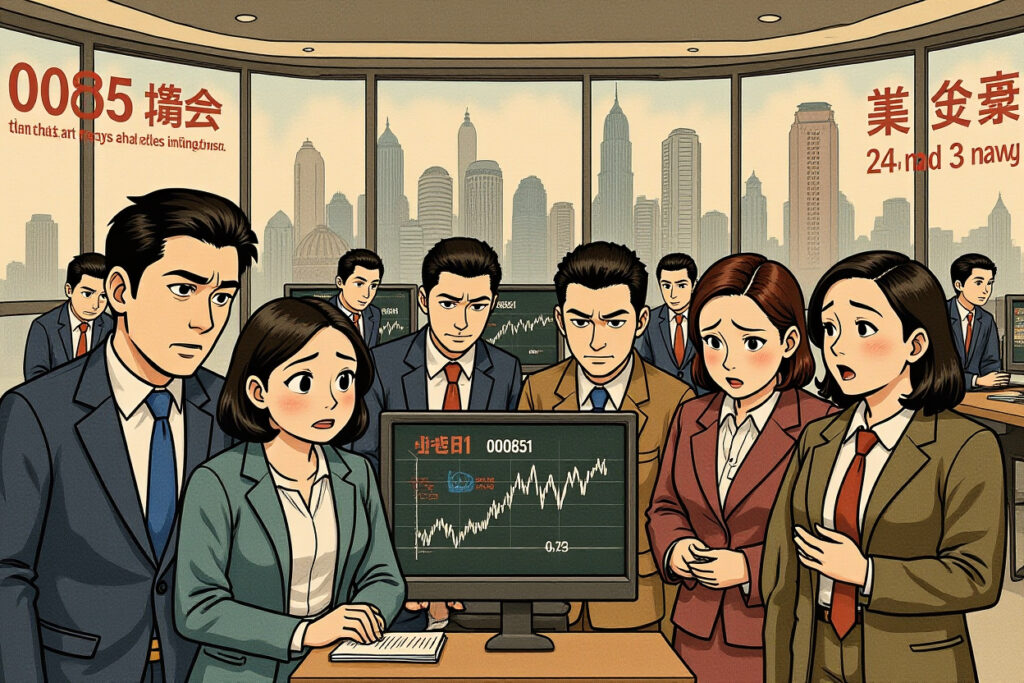Political Impasse Threatens Global Market Stability
The specter of a U.S. government shutdown has returned as political divisions between Republicans and Democrats reached a critical breaking point Friday. President Donald Trump acknowledged the high probability of federal operations halting, stating from the Oval Office that the government would “likely be shut down for some time.” This development carries significant implications for global financial markets, particularly Chinese equities that remain sensitive to U.S. political and economic stability.
Market analysts immediately began assessing potential ripple effects across Asian markets, with particular attention to how a prolonged U.S. government shutdown might affect investor confidence in Chinese securities. Historical patterns suggest that political instability in Washington often triggers volatility in emerging markets, though the specific impact on Chinese equities remains nuanced given current trade dynamics and domestic economic policies.
Budget Negotiations Reach Impasse
Earlier Friday, Senate Republicans and Democrats mutually rejected each other’s temporary funding proposals, creating a legislative vacuum with no clear path forward. The Senate subsequently adjourned until September 29, while the House of Representatives isn’t scheduled to reconvene until after October 1 – the exact date when current funding expires.
The core disagreement centers on healthcare spending increases demanded by Democrats, which Republicans have firmly rejected. GOP leadership insists on passing a “clean” short-term funding bill that would maintain government operations through November 21 without policy concessions. Republican strategists believe Democrats will eventually capitulate as the deadline approaches to avoid being blamed for government closure.
Legislative Mechanics and Failed Votes
Senate Majority Leader John Thune framed the decision starkly before the vote: “The choice is very clear: either pass a simple, clean short-term continuing resolution, or the government shuts down. The choice rests with the Democrats.” However, the Republican version of the temporary funding measure garnered only 44 votes, falling well short of the 60 needed to overcome procedural hurdles in the Senate.
Democratic Leader Chuck Schumer proposed an alternative extending funding through October 31, but this also failed 47-45. Thune dismissed this proposal as “completely insincere” and urged unified Republican opposition. The legislative deadlock represents one of the most significant budget impasses in recent years, coming amid already tense global economic conditions.
Market Implications of Previous Shutdowns
Historical analysis of previous U.S. government shutdowns provides context for potential market impacts:
– The 2013 shutdown (16 days) saw the S&P 500 decline 3.1% during the closure period
– The 2018-2019 shutdown (35 days) created approximately $11 billion in permanent economic damage according to Congressional Budget Office estimates
– Chinese equities typically experience indirect effects through global risk sentiment channels rather than direct fundamental impacts
However, current market conditions differ substantially from previous shutdown environments, with additional complications from trade tensions and pandemic recovery patterns.
Chinese Market Vulnerability Assessment
Chinese equity markets face particular vulnerability to U.S. political instability given the interconnected nature of global finance. A U.S. government shutdown could affect Chinese markets through multiple transmission channels:
– Reduced risk appetite among global investors might lead to capital outflows from emerging markets
– Delayed economic data releases from U.S. agencies could cloud global economic visibility
– Potential disruptions to trade policy implementation might create additional uncertainty
Market professionals are particularly concerned about how a prolonged U.S. government shutdown might affect already delicate U.S.-China trade relations. Any disruption to ongoing negotiations or implementation of phase one trade deal provisions could negatively impact export-sensitive Chinese sectors.
Sector-Specific Implications
Analysis of potential sector impacts reveals varied vulnerability across Chinese equity markets:
Technology and manufacturing sectors with significant U.S. exposure might experience heightened volatility
Domestic consumption-oriented stocks could prove more resilient to U.S. political developments
Financial services companies with international operations might face operational complications
The timing coincides with delicate moments in several Chinese economic initiatives, potentially amplifying effects beyond what historical patterns would suggest.
Investor Strategies for Shutdown Scenarios
Sophisticated institutional investors are already implementing contingency plans for various shutdown scenarios. Common strategies include:
– Increasing hedges against volatility spikes in Chinese equity derivatives
– Rebalancing portfolios toward domestic-focused Chinese companies
– Establishing tactical positions in safe-haven assets while maintaining Chinese equity exposure
Fund managers emphasize that the direct economic impact of a U.S. government shutdown on Chinese fundamentals remains limited. However, the psychological impact on market sentiment could create buying opportunities for investors who maintain perspective on China’s independent economic trajectory.
Historical Performance Patterns
Analysis of Chinese equity performance during previous U.S. government shutdowns reveals interesting patterns:
During the 2013 shutdown, the Shanghai Composite declined 1.5% but recovered fully within two weeks
The 2018-2019 shutdown period saw Chinese equities outperform most emerging markets despite U.S. volatility
Sector performance varied significantly based on domestic Chinese factors rather than U.S. political developments
This historical context suggests that while short-term volatility might increase, fundamental drivers of Chinese equity performance remain predominantly domestic.
Regulatory and Policy Considerations
The potential U.S. government shutdown occurs amid already complex regulatory environments for Chinese equities. International investors must consider multiple dimensions:
– How delayed U.S. regulatory approvals might affect cross-border investment flows
– Potential complications for Chinese companies listed on U.S. exchanges
– Impacts on ongoing negotiations regarding accounting standards and audit requirements
Chinese regulatory authorities have been monitoring the situation closely, with officials from the China Securities Regulatory Commission (CSRC 中国证监会) preparing contingency plans for various scenarios. The relatively contained nature of previous shutdown effects provides some comfort, but the current geopolitical context requires heightened vigilance.
Expert Perspectives on Market Stability
Financial experts emphasize the importance of maintaining perspective amid political drama. As noted by prominent economist Zhang Ming (张明) of the Chinese Academy of Social Sciences: “While U.S. political developments attract attention, Chinese market fundamentals remain driven by domestic policy and economic conditions. Investors should avoid overreacting to temporary political theater that historically has limited lasting impact on Chinese asset prices.”
This sentiment echoes across many institutional research desks, though most recommend increased monitoring of capital flow patterns and risk premium adjustments during periods of U.S. political uncertainty.
Forward-Looking Market Guidance
The evolving situation requires sophisticated investors to maintain flexibility while avoiding knee-jerk reactions. Several key considerations should guide investment decisions:
– Focus remains on Chinese economic indicators and policy developments rather than U.S. political noise
– Any market volatility likely creates opportunities rather than fundamental threats
– Long-term investment theses for Chinese equities remain intact despite short-term noise
Market participants should prepare for potential volatility while recognizing that the underlying drivers of Chinese equity performance continue to strengthen. The country’s economic rebalancing, technological advancement, and financial market development provide substantial buffers against foreign political disruptions.
Investors should maintain their strategic allocations to Chinese equities while implementing tactical adjustments based on risk tolerance and investment horizon. The current environment may present attractive entry points for investors who have been waiting for better valuations in high-quality Chinese companies.
Monitoring developments through reliable news sources and maintaining dialogue with investment advisors remains crucial during periods of increased uncertainty. The situation underscores the importance of disciplined investment processes and avoiding emotional decision-making based on political headlines rather than economic fundamentals.




